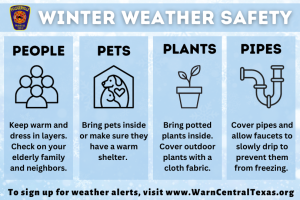Be Prepared!
The best way to tackle the cold weather and winter storms is to be prepared! Start preparing your home now and have a plan before an issue arises.
Take action now:
- Make sure you have working smoke alarms! Ensure alarms are working by testing each one and make sure they are not more than 10 years old. If they are older than 10 years, they are expired and need to be replaced.
- Install one carbon monoxide alarm per level of your home.
- Insulate any water lines that run along exterior walls so your water supply is less likely to freeze.
- Caulk and weather-strip doors and windows.
- Repair roof leaks and cut away tree branches that could fall on your home or other structure during a storm.
- Be ready in case the power goes out. Have flashlights ready and extra batteries on hand.
- Locate your water shutoff. Know where the main shutoff valve is and how to turn your water off incase of an emergency.
- Know the name and contact information for all your utility service providers.
- Have a few days worth of extra water and nonperishable food on hand.
- Ensure you have at minimum three days worth of prescription medications.
Protect the 4 P’s:

When winter weather hits, it important to protect people, pets, plants, and pipes.
People
- Stay indoors and do not drive if there is ice accumulation on the roads.
- Make sure all devices and back up batteries are fully charged. A cell phone may be your only means of receiving information during a power outage.
- Check on you elderly family and neighbors.
- Dress in loose warm layers. Make sure to have gloves and hats.
- Heat your home safely. Using the stove to heat your home is not safe. Instead use a fireplace and only burn clean, dry wood.
- Do not use gas, propane, or charcoal-burning appliances such as generators, camp stoves, or grills inside the house. Ensure generators are at least 20 feet away from your home and is not used in an enclosed space.
- Stay clear of all downed utility lines and remember electricity can travel through the ground, fencing, playscapes, etc. If you see a downed line arcing, sparking, or smoking or if it crosses a roadway, call 911. Otherwise, isolate the area and reach out to your utility provider.
Pets
- Bring your pets inside to keep them safe and warm.
- Ensure their food and water does not freeze.
Plants
- Bring potted plants indoors.
- Cover outdoor plants before cold weather sets in to help retain some heat.
Pipes
- Insulate pipes and wrap outdoor faucets.
- Slowly drip interior faucets.
- Open up sink cabinets to expose pipes to heated air.
- Disconnect hoses and turn off water to sprinklers.
- For more information on protecting your pipes, watch this video from the Texas Department of Insurance.
